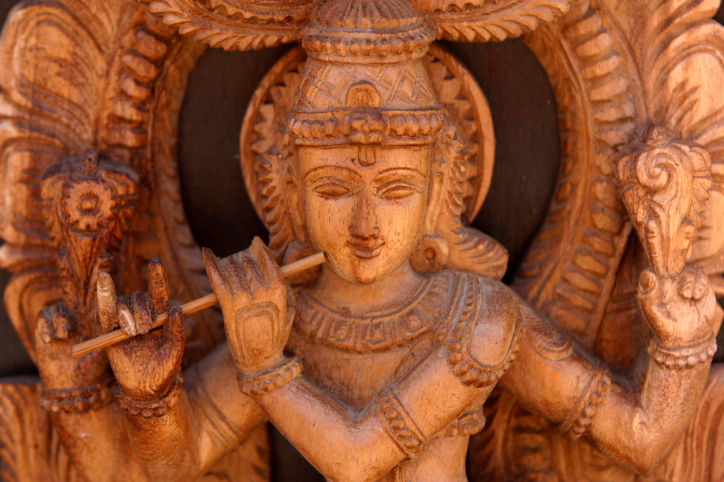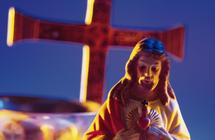ONE FAMILY PLAN
Hinduism and Christianity
The Hindu Scriptures cited predate the Christian New Testament by at least 500 years.
Brahman is the unchanging, all- embracing Reality behind the universe, known in the Upanishads as the “divine Lord, the personal God, endowed with manifold glories,” who “holds dominion over all the worlds” and is “one without a second.” (Svetasvatara Upanishad; Prabhavananda, 1948:121)
“…endowed with infinite power, Brahman is the lord of lords." (Swami Nikhilananda, 1949:72)
“Thereupon the fire which had been an earthly fire with which to prepare sacrifices assumed a new aspect and became the Lord himself. The earth was transformed; life was transformed; the sun, the moon, the stars, the lightning everything was transformed and deified.” (Chandogya Upanishad)
“I have come to cast fire upon the earth; and how I wish it were already kindled!” (Luke 12:49)
“The whole universe came forth from Brahman and moves in Brahman...In Brahman it lives and has its being.” (Katha Upanishad)
“Yet [God] is not far from each of us, for ‘In him we live and move and have our being’...” (Acts 17:27, 28)
“Living in the abyss of ignorance, yet wise in their own conceit, the deluded go round and round, like the blind led by the blind.” (Mundaka Upanishad)
“...they are blind guides. And if a blind man leads a blind man, both will fall into a pit.” (Matt. 15:14)
“I destroy the darkness born of ignorance with the shining light of wisdom.” (Lord Krishna, the leading Hindu incarnation of God; Bhagavad Gita, Ch. 10, vs. 11)
“I am the light of the world: he who follows me will not walk in darkness but have the light of life.” (Jesus, the Christian incarnation of God; John, Ch. 8, vs. 12)
“...I am the origin of the whole world and also its dissolution...l am the beginning, the middle, and the end of all things.” (Lord Krishna in the Bhagavad Gita, Ch. 7 Vs. 6, Ch. 10 vs. 20)
“I am the Alpha and the Omega, the first and the last, the beginning and the end.” (Rev 22:13)
Buddha teaches that Nirvana is the state of enlightenment, a life free from suffering (dukkha) and anxiety. Suffering’s cause is desire or craving (tanha) which means “thirst.” Nirvana is “tanhakkayha” signifying “extinction of thirst.” (Rahula 1959:35-43)
“…knowledge of Brahman having drunk of which one never thirsts...” (Chandogya Upanishad)
“Whoever drinks of the water that I shall give him will never thirst.” (John 4:13)
“...What is it that impels a man to commit sin, even involuntarily, as if driven by force...? It is desire, it is anger ...all consuming and most evil. Know this to be the enemy here on earth.” (Bhagavad Gita III:36,37)
“...but each person is tempted when he is lured and enticed by his own desire. Then desire when it has conceived gives birth to sin...” (James 1:14,15)
Yoga is the practice whereby one enters into union with the divine. It is from the Sanskrit “to yoke.” (Deutsch, 1968:6)
“...that they may all be one; even as thou, Father, art in me, and I in thee, that they also may be in us...” (John 17:21) “…take my yoke upon you, and learn from me; for I am gentle and lowly at heart, and you will find rest for your souls...for my yoke is easy and my burden is light.” (Matt. 11:29, 30)
Man’s spirit is “Atman” or “Self.” Through enlightenment Atman is realized to be Brahman. Atman is God within.
“…now if a man depart this life without knowing the kingdom of the Self, he, because of that ignorance, does not enjoy the bliss of liberation. He dies without reaching the goal...Wherefore let him know the kingdom of the Self, and that alone.” (Brihadaranyaka Upanishad)
“The kingdom of God is not coming with signs to be observed; nor will they say, 'Lo, here it is!' or 'There!' for behold, the Kingdom of God is within you.” (Luke 17:20, 21)
“Smaller than a grain of rice is the Self, smaller than a grain of barley, smaller than a mustard seed...Yet again is that Self within the lotus of my heart, greater than the earth, greater than the heavens, yea, greater than all the worlds.” (Chandogya Upanishad)
“With what can we compare the kingdom of God...It is like a grain of mustard seed, which, when sown upon the ground, is the smallest of all the seeds on earth; yet when it is sown it grows up and becomes the greatest of all shrubs, and puts forth large branches, so that the birds of the air can make nests in its shade.” (Mark 4:30-32)
“As one not knowing that a golden treasure lies buried beneath his feet, may walk over it again and again, yet never find it, so all beings live every moment in the city of Brahman, yet never find him, because of the veil of illusion by which he is concealed.” (Chandogya Upanishad)
“The Kingdom of heaven is like treasure hidden in a field, which a man found and covered up; then in his joy he goes and sells all that he has and buys that field.” (Matt. 13:44)
“The door of truth is covered by a golden disc. Open it, O Nourisher! Remove it so that I who have been worshipping the truth may behold It.” (Isa Upanishad) “Wisdom is veiled by ignorance. Thereby creatures are deluded” (Bhagavad Gita, V:15)
“And [the Lord] will destroy on this mountain the covering that is cast over all peoples, the veil that is spread over all nations.” (Is 25:7) “…But when a man turns to the Lord the veil is removed... And we all, with unveiled face, beholding the glory of the Lord, are being changed into his likeness from one degree of glory to another…” (2 Cor. 3:16, 18)
“...the wise, knowing the Self as eternal, seek not the things that pass away.” (Katha Upanishad)
“...because we look not to things that are seen but to things that are unseen; for the things that are seen are transient, but the things that are unseen are eternal.” (II Cor. 4:18)
“He who dwells in the sky and makes lightning his home,” and as “Mighty and awful...like to a thunderbolt crashing throughout the heavens.” (Chandogya Upanishad; Katha Upanishad)
“For as the lightning flashes and lights up the sky from one side to the other, so will the Son of man be in his day.” (Luke 17:24; see also Matt. 24:27)
“...for the world of Brahman is light itself.” (Chandogya Upanishad)
“...God is light and in him is no darkness at all.” (I John 1:5)
“Thou, [Brahman] sole guardian of the universe, thou, lord of all, in the hearts of thy creatures thou hidest thyself...Of all religions thou art the source. The light of thy knowledge shining, there is nor day nor night, nor being nor non-being, thou alone art.” (Svetasvatara Upanishad)
“And the city has no need for sun or moon to shine upon it, for the glory of God is its light, and its lamp is the lamb...and night shall be no more; they need no light of lamp or sun, for the Lord God will be their light, and they shall reign forever and ever.” (Rev. 21:22, 23; Rev. 22:5)
Christ and Krishna
Both Christ and Krishna is the incarnation of God or avatar.
Christ was “in the beginning with God” and “all things were made through Him.” (John 1:1-3) Christ is “the image of the invisible God” (Col. 1:15) in whom “all things were created in heaven and on earth visible and invisible.” (Col. 1:16)
Krishna is the “source of all beings, Lord of all creatures, God of gods, Lord of the world.” (Bhagavad Gita, X:15) “I am the source of all; from me all arises.” (X:8) “…All this (universe) is strung on me like jewels on a string.” (VII:7)
Christ is “before all things and in him all things hold together.” (Col. 1:17). God will “unite all things in him [Christ], things in heaven and things on earth.” (Eph. 1:10)
Krishna is that in which all things are united…
“Behold today the whole world of moving and unmoving things, united in My Body.” (XI:7)
Free from sin in Christ…
“…ye were the servants of sin… But now being made free from sin… servants to God…” (Romans 6:20-22)
Free from sin in Krishna…
“He who knows Me… is undeluded and is freed from all sins.” (X:3)
Christ “came into the world but the world knew him not.” (John 1:10)
Krishna says “I am not revealed to all being covered by My power of illusion. This world is deluded and does not recognize Me…” (Bhagavad Gita, VII:25)
Christ…
“…he will judge the world in righteousness by that man whom he hath ordained; whereof he hath given assurance unto all men…” (Acts 17:31)
Krishna…
“For the preservation of good, for the destruction of evil, for the establishment of righteousness, I come into being in age after age.” (IV:7)
Christ is the “Light of the world.” (John 8:12); Krishna is likened to “a mass of light shining everywhere with the radiance of flaming fire and the sun, difficult to regard beyond all measure.” (IX:17)
The ultimate Unity of life is Brahman (Yogi, 1967:5).
“This Unity pervades the universe and yet is beyond it. All objects, animate and inanimate, are included in it. Gods, men, and subhuman beings are parts of It. As the unchanging Reality behind the universe, It was called Brahman by the Hindu philosophers; and as the indestructible Spirit in man, It was called Atman. Brahman and Atman, identical in nature, were the First Principle.” (Nikhilananda, 1949:25)
“With eyes on all sides and mouths on all sides, with arms on all sides and feet on all sides, the One God created the sky and the earth, fanning them with his arms.” (Rig Veda, 10.81.3; O'Flaherty, 1981:36)
“The All-Maker is vast in mind and vast in strength. He is the one who forms, who sets in order and who is the highest image…” (Rig Veda, 10.82.2; O'Flaherty, 1981:36)
“…The Lord is one without a second. Within man he dwells, and within all other beings. He projects the universe, maintains it, and withdraws it into himself.” (Svetasvatara Upanishad; Prabhavananda, 1948:121)
“Let a man, freed from the taint of passion, worship Brahman alone.” (Chandogya Upanishad; Prabhavananda, 1948:64)
Brahman is the all-embracing Reality… Brahma is the creator deity, “first created being in the relative universe.” (Nikhilananda, 1948:73) He is among the Hindu trinity… beside Vishnu, the preserver deity, and Shiva, the deity of destruction.
Brahman is eternal and self-existent…
The “divine Lord” and “personal God” is “Isvara,” (also spelled Ishvara) which has three aspects:
“As Brahma He creates, as Vishnu He preserves, and as Siva (older spelling of Shiva) He destroys. These three form one Lord, or God, who is known by three different names according to His three functions.” (Nikhilananda, 1949:72)
The Supreme Lord is “Mahasvara” who is “one without a second.”
“Endowed with infinite power, Brahman is the Lord of Lords…” (Nikhilananda, 1949:72)





